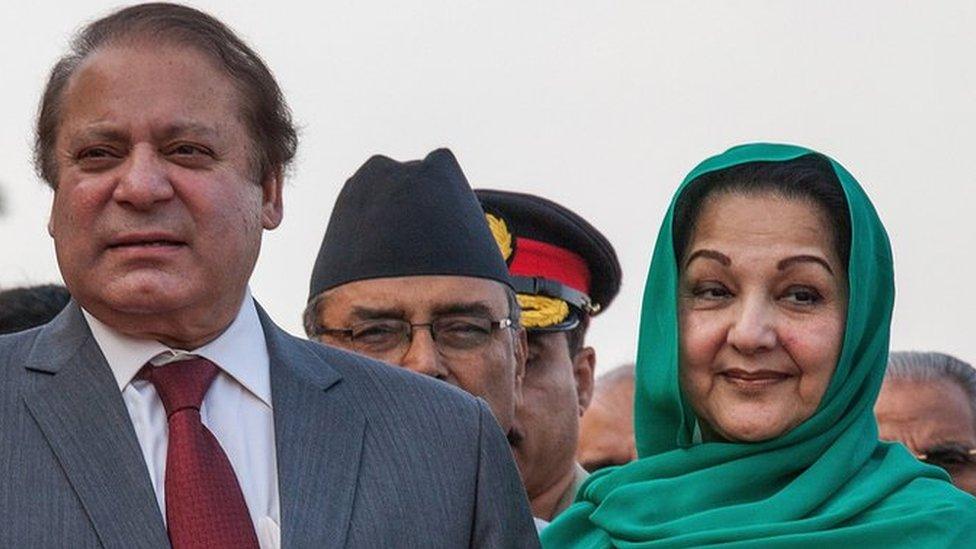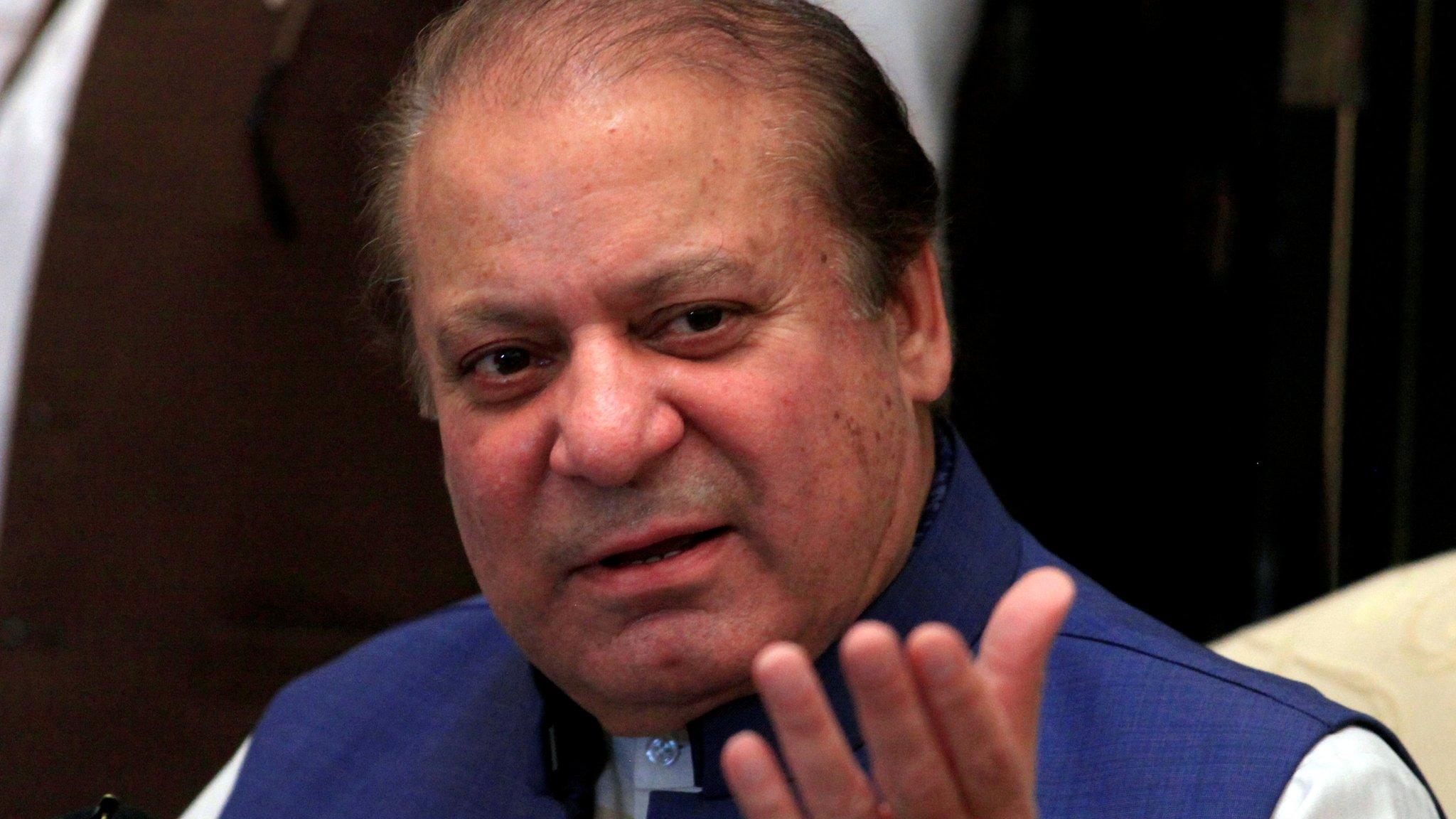Kulsoom Nawaz: Ex-Pakistan PM's wife dies in London
- Published

Maryam Sharif (right) said goodbye to her mother in July before leaving to Pakistan, where she was arrested
Kulsoom Nawaz, the wife of Pakistan's ousted former Prime Minister Nawaz Sharif, has died in London. She was 68.
The three-time first lady was diagnosed with cancer in August 2017, and suffered a heart attack on 14 June.
Her husband and daughter, Maryam, are both in jail in Pakistan. They returned to face corruption convictions ahead of July's election, leaving the ailing Ms Nawaz in London.
She was elected as an MP in 2017 after standing in for Nawaz Sharif.
But she was not sworn in as she was already abroad for cancer treatment.
When Nawaz and Maryam Sharif left London for Pakistan in July, they knew they faced lengthy jail terms and would likely not see Ms Nawaz again.
Mr Sharif had said the charges - related to the ownership of luxury London flats - were politically motivated.
Recently elected Prime Minister Imran Khan calls Ms Nawaz "a courageous woman of great dignity".
Kulsoom Nawaz married Nawaz Sharif in 1971 and her husband was prime minister of Pakistan on three occasions - 1990-1993, 1997-1999 and 2013-2017.
Ms Nawaz was born Kulsoom Rehana Butt in 1950 to a businessman and investor, Mohammad Hafeez Butt, and his wife Razia Begum.
She had two sisters and two brothers.

Kulsoom Nawaz's husband, Nawaz Sharif, has been jailed on corruption charges - which he says are politically motivated
Mr Butt's family has Kashmiri origins and has deep roots in Lahore city, while Razia Begum hailed from a well-known family of wrestlers from Amritsar, India, who migrated to Lahore in 1947.
Ms Nawaz is the granddaughter of the famous wrestler Gama Pehlwan, or the Great Gama, on her maternal side.
She completed her Masters in Urdu literature from Lahore's prestigious Foreman Christian College University in 1970, and soon after married Mr Sharif, who came from a family of wealthy industrialists.
However their industries were nationalised in the 1970s under the socialist regime of the country's first popularly elected prime minister, Zulfikar Ali Bhutto. As a result, the family welcomed the military coup of 1977 which toppled Mr Bhutto's government and sent him to the gallows two years later following a controversial trial.
Introduction to politics
Aware that the family needed to build its political clout, Ms Nawaz's father-in-law, Mian Mohammad Sharif, arranged for her husband to step into the world of politics.
He joined the military-backed Pakistan Muslim League in 1977, and was groomed by the then military governor of Punjab, Gen Ghulam Jillani Khan.
A graduate in business studies, Sharif soon found himself appointed the minister of finance in the military-run cabinet of Punjab province. In the non-party elections of 1985 he rose to become the chief minister of Punjab, and went on to become Pakistani prime minister for the first time in 1990.
He would be removed from office in 1993, but return again to the top post in 1997.
Kulsoom Nawaz spent these years in the background, as the daughter-in-law of a super-rich industrial family with vast political influence. The couple had four children - two sons and two daughters.
Her first direct exposure to the harsh political landscape of Pakistan came in October 1999 when her husband's government was toppled and he was imprisoned. She was detained by military policewomen and placed under house arrest along with other members of the family.
Headlines of her own
They were to remain in confinement for a year until Nawaz Sharif, having been sentenced to life imprisonment by a military court, was exiled to Saudi Arabia with his family after he agreed not to return to the country to practise politics for the next 10 years.
Kulsoom Nawaz - who became interim president of the PML-N party - made her own political headlines during her detention when she defied her guards and led a procession from her Model Town residence across Lahore city.
She remained party president until 2002.
Allow X content?
This article contains content provided by X. We ask for your permission before anything is loaded, as they may be using cookies and other technologies. You may want to read X’s cookie policy, external and privacy policy, external before accepting. To view this content choose ‘accept and continue’.
She would not take to politics again until last year, after her husband - now prime minister again - was disqualified by the Supreme Court from holding a public office.
The party decision to nominate her in the by-election to fill Nawaz Sharif's seat surprised many who were expecting the ousted PM to promote his daughter Maryam as his political heir.
But some observers pointed out that Kulsoom Nawaz was no political novice.
She had stood by Nawaz Sharif during his entire political career since the late 1970s, and was understood to have advised him on various matters. According to some party leaders, she also occasionally wrote Mr Sharif's speeches. And when he was arrested by the Musharraf regime in the 1999 coup, she spearheaded the campaign for his release.
But life as a politician in her own right was not to be for Ms Nawaz.
She showed up at the Election Commission to file her nomination papers, but then suddenly departed for London on the very day she was to reappear at the commission to respond to objections raised on her candidature by rivals.
There was some initial criticism of the PML-N leadership by those who saw the trip abroad as evidence the party was taking its voters for granted. But it soon transpired that she had been diagnosed with lymphoma.
Her nomination was finally cleared, and she won the election against a candidate from Imran Khan's PTI party by a wide margin.
But she could never return to the country to take her oath as a member of parliament.
- Published23 August 2017

- Published6 July 2018
